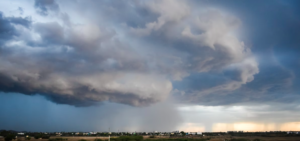As part of the Intergenerational Foundation’s COP26 blog series, John Paul Jose, a young environmental activist based in India, sets out the potential costs of the climate crisis and calls on polluters and world leaders to step up and show leadership to secure a healthy and sustainable Earth, fit for future generations.

Fear for the future
50% of the global population is under 30. My parents’ generation was able to lead a normal life, but my generation has to live with the fear of the future due to climate change, without the same opportunities to think about and plan for a normal and peaceful future.
According to recent studies, the climate crisis is also leading to anxiety and negative emotions among young people worldwide and is even higher for people from vulnerable nations. “The Lancet report on Health and Climate Change” states that without efforts to cut down emissions, the climate crisis will define the lives of future generations. UNICEF also outlines that over 1 billion children are exposed to the climate crisis due to their vulnerable location.
Historically, people like me have lost cultural continuity, equality and intergenerational equity due to centuries of colonialism. Knowing about the climate crisis is a privilege that comes from having had an education, but facing up to it is the greatest educational challenge in our lifetimes.
A future which others dictate
Unfortunately, ever since world leaders began to gather to act on the climate, emissions have continued to skyrocket. The climate crisis is becoming catastrophic. I am one of those victims, due to my family’s dependence on nature for our livelihood and living in a vulnerable geography.
Without acting on the climate crisis, young people like me are growing up facing an insecure future. And if we are not part of these decisions concerning our future, we have to live the future that others dictate for us.
Real actions
We cannot rely on promises that are not being kept. We have been hearing about ‘Climate Action’, ‘COP’ and ‘Net Zero’, but as of today these have not been translated into real actions. Meanwhile, every day we face a mounting climate crisis, exacerbating our existing socio-economic insecurity.
COPs could and should have been a platform for vulnerable groups, indigenous communities, activists and NGOs to share stories, convey concerns to an international audience, and demand world leaders to act. But, COPs continue to deny platforms to those who need them the most.
Rather, polluters have been downplaying what COPs stand for. At COP26 while polluters have no roles leaders are still coming with the same old strategies of negotiating economic opportunities and profits with industries. They continue to come out with greenwashing terms and leave the conference without the ambitious, legally binding targets for emission reductions that are required to safeguard younger and future generations. Distant targets show an ignorance towards climate science, crisis, deaths, livelihood and economic loss. “Act now” is what we need.
Who should pay?
We should not be concerned about business talks or negotiations for business opportunities amidst a crisis. While governments continue to put off the real actions required, my countrymen and women live in fear and continue to lose lives and livelihoods one by one under the climate crisis. Right now, it is difficult to imagine a future free from environmental destruction, refugee camps, lost traditions and shattered livelihoods. We need assistance in protecting our environment, safeguarding our livelihood, securing continuity for traditions and an equitable society.
We need compensation for loss and damage caused by the climate crisis, which is fuelled by polluting industries and developed countries. As part of historical injustices through colonialism and damages to nature, developed countries and polluters should also pay for the remaining roadmap to socio-economic security in programmes like poverty alleviation and livelihood adaption in developing countries.
Give us our chance for a safer future
There is no way out of the climate crisis without phasing out fossil fuels and other contributing factors. At the same time, climate justice is key to ensuring the wellbeing of our societies and of the planet as a whole.
It is unfortunate to see, even now, the focus is so one-sided. More than half of the global population, especially those living in the global south, depend on nature for their livelihoods via agriculture, fishing, forestry, tourism, etc. But there are no scientific mechanisms in place to help us to: adapt to the existing or unforeseen climate emergencies; to be more resilient; and to mitigate many of the impacts that will be so detrimental to our life and environment.
At the very least COP26 should have been a platform to listen to us, for leaders to come down to our vulnerable locations, hear us and help us. But COP26 is essentially inaccessible for people like us. Young people and future generations should have a chance to build a safe future.
Help us to be able to do more
Now that you’ve reached the end of the article, we want to thank you for being interested in IF’s work standing up for younger and future generations. We’re really proud of what we’ve achieved so far. And with your help we can do much more, so please consider helping to make IF more sustainable. You can do so by following this link: Donate
Photo by Ganesh Partheeban on Unsplash
